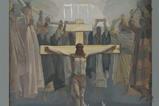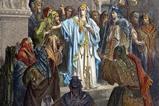Elaine Storkey looks at the Olympic imagery found in the New Testament letters, and encourages us to keep persevering in our own races
Study passages: 1 Corinthians 9:24-27, Hebrews 12:1
Olympic fervour existed in New Testament times, probably as much as today. The ancient Olympic Games date back to 776BC and grew in size over hundreds of years before they stopped. And in our recent Olympic Games, the lighting of the torch in Olympia reminded us that Greece is where they all began.
By the time St Paul was visiting and writing to the new Christians in the Greek cities, the Olympic Games were huge. The city states would be selecting their ‘champions’ to represent them in a range of different events: discus throwing, javelin, jumping, wrestling…in addition to all the foot chariot races. Women didn’t compete in the Olympic sports, but had their own events, the Heraean Games – for young unmarried women only. One initial difference separated the two; whereas many of the men’s sports involved men performing naked, women by contrast were obliged to wear suitable clothes!
Have you noticed how often St Paul and others compared life with a race?
It makes sense that the New Testament letter writers would have drawn on sporting metaphors because it was an obvious way of linking the gospel to things that were familiar in the culture of their readers. Have you noticed how often St Paul and others compared life with a race? The discipline of the athlete and the importance of training were all used to encourage us to get spiritually fit so we can run our own race in faithfulness to God.
Dealing with the pagan roots
Yet a paradox is evident here. For in their origin, the Olympic and Heraean Games had very non-Christian roots. In fact, they were deeply pagan, even in their performances. The brutal, often violent, competitiveness of the male events often reflected the ferocity of the Greek and Roman gods. One journalist, Betsy Carpenter described the combative events as “a vicious mix of wrestling, boxing, and street fighting in which punches, kicks to the groin, shoulder and ankle dislocations, and chokeholds were allowed” (‘The First Olympics’, U.S. News & World Report). Chariot races were also horrendously gory, with competitors often disfigured, maimed or even beheaded in their attempt to win the prize. It seems a long way from aspiring to the ‘crown’ that Paul wrote about.
The pagan celebration started before the Games began. Competitors assembled and processed to the village of Piera on the outskirts of Olympia to watch priests sacrifice a bloated pig to Zeus, and then participate in a purification ritual. A second sacrifice took place in an opening ceremony before the colossal statue of Zeus in Olympia, when the athletes swore solemn allegiance to the gods.
It must have been hard for Christians to cope with the religious focus of the Games. The gods were barely ever absent. The winners of events went to the temple to offer their own animal sacrifices. On the third day, priests took embers from the fire dedicated to the goddess Hestia and, watched by hundreds of spectators, processed to the Temple of Zeus singing hymns to the god. When the altar fire was lit from the embers, 100 bulls were slaughtered in animal sacrifice, after which feasting began. All this unbridled idolatry caused many early Christian leaders to caution young Christians against any involvement.
So why were the New Testament writers so keen to draw people’s attention to athletics, and therefore, the Games? I believe it was partly to remove the pagan meanings surrounding these concepts. In using them as metaphors for the Christian life, the New Testament writers emptied the language and images of their pagan origins in the Games and gave them new life in Jesus.
We can see how effective they were just by looking at some examples. Take the writer to the Hebrews, for example: “Therefore, since we are surrounded by such a great cloud of witnesses, let us throw off everything that hinders and the sin that so easily entangles. And let us run with perseverance the race marked out for us” (Hebrews 12:1).
The author had just talked about people faithful to God in the Old Testament and here likened them to a great crowd of spectators cheering at a sporting event. The “cloud of witnesses” encourages Christians to get rid of whatever holds us back, and not to get entangled in anything that messes us up, so we can concentrate on running the race. Yet the race we are now running is not that of the ancient Olympics but one that leads towards fullness of life in Christ.
In his letter to the church at Corinth, Paul drew on metaphors of running, boxing and competing (see 1 Corinthians 9:24-27). He clearly had the Olympics in mind, because in those days there were no gold, silver or bronze Olympic medals – only one winner. The “crown” to be won had great religious significance but it was simply an olive branch twisted into a circle. In contrasting this perishable crown with the eternal crown given by Jesus, Paul was completely demoting the worship of pagan gods. In distinction from idol worshippers “running aimlessly” or simply “beating the air” (v26), Christians practice discipline so we can run the race God has set us in.
In two more passages, James and the writer to Timothy both point to the crown that Jesus promises, and echo how important it is for us to keep going, even through all the difficulties of the race:
“Blessed is the one who perseveres under trial because, having stood the test, that person will receive the crown of life that the Lord has promised to those who love him” (James 1:12).
“I have fought the good fight, I have finished the race, I have kept the faith. Now there is in store for me the crown of righteousness” (2 Timothy 4:7-8).
So, in handling the themes of the Olympics in a way that highlighted the calling of our life in Jesus, these writers helped our early sisters and brothers to see the futility of idol worship and focus on their calling before God. They were urged to persevere, to train and discipline themselves, not as homage to blocks of marble and stone, but as followers of Jesus who promises to be still with us, even when the race has ended.

How does this speak to us today?
Today we’re still running the race that God has put us in, so all the New Testament metaphors linked to the Olympic Games are relevant to our lives. We still need to train our bodies and to discipline ourselves to become spiritually fit. We need to avoid distraction, and get rid of anything that gets in the way of our calling. We shouldn’t give up when the going gets tough but persevere to the very end. In all this, little has changed through the centuries.
What has changed is that we no longer live against the backcloth of pagan Greek idolatry. Hercules and his Olympic stadium to Zeus have long been relegated to legend. Yet we have gods in our time that would draw us away from worshipping the true God. The idols of money, sex and power are as powerful today as they have ever been. And enormous global forces are at work in our present world, which represent deep spiritual darkness. Militarism, tyrannical leadership, sexual violence, abuse of the vulnerable and gross damage to God’s creation are all formidable opponents to contend with, as we run our race today.
Many of us, however, are held back by more commonplace things. Disappointment, loss or spiritual fatigue can leave us feeling defeated. People who hurt us on the way make it hard to carry on. Paul’s advice is to let go of what lies behind and just reach out to what is in front of us (Philippians 3:13-14). It’s not easy. But Jesus promises us that we’re not running on our own. The Holy Spirit can keep us going, for God is with us in every step we take.



































No comments yet